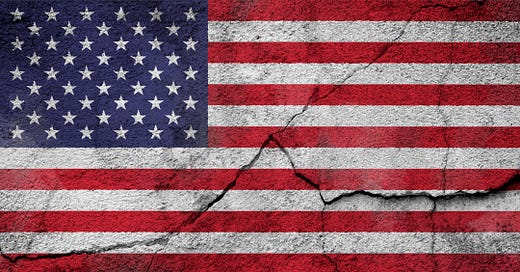Want Better Democracy? Find Better Politicians
Citizens around the world say more honest and competent political leaders would help improve democratic governance.

The future of democracy is a big topic of debate these days, in both serious and hyperbolic ways. This is particularly true in the U.S. presidential election where the leaders of both political parties claim that democracy as we know it will end if Americans vote for the other party.
But according to a massive new study of global opinion from the Pew Research Center, including more than 30,000 interviews across 24 countries, political leaders themselves need to look in the mirror if they really want to help democracy.
In 20 of the 24 countries surveyed by Pew in 2023, citizens mention “politicians” most frequently among 17 different topics that would help improve the way democracy works in their country. Concern about the quality of political leaders is notably high in countries such as Spain, France, Nigeria, and Italy where more than one third of citizens cite better or new politicians as the top way to improve democracy.
Other structural reform ideas are also mentioned by citizens in different countries, generally focused on better economic supports and improved quality of life measures for people along with institutional reforms to reduce the power of special interests or increase direct democracy. Likewise, many view better citizenship by ordinary people as key to improving democracy. This includes more kindness, fairness, and respect toward others; appeals to end social and religious conflicts between groups; and increased civic participation and education among citizens themselves.
What exactly do people mean when mentioning new or better politicians as a primary way to improve democracy? According to Pew:
Some would like to see different people in politics, or more representation. Others focus on the qualities of politicians, such as honesty or empathy, but also their skillset and general competence. Still others ask that politicians change their behavior, both when working with each other and when working with constituents, emphasizing responsiveness.
Translated into concrete changes, this means getting more “normal” people in politics including those with regular working- and middle-class backgrounds and candidates who aren’t rich. It also involves developing next generation politicians who are younger and more representative of the full-range of communities in respective countries.
Basic competency also matters a great deal to citizens around the world. As one participant in Japan told Pew researchers: “We need politicians who have common sense and can think logically.” Others cite the need for actual policy expertise above the bloviating media-driven nonsense spewed by many politicians today. Similarly, people across the globe desperately want to see politicians with greater integrity and more empathy—meaning a real ability to listen to constituents and the dedication to follow through on promises to voters.
Political parties get a drubbing in the Pew research, with global citizens generally displeased with the party choices they are given each election and baffled by the actions taken by many party leaders. Some citizens in nations with chaotic multi-party systems pine for a two-party setup more like the U.S., while those with fewer parties strongly desire less fighting and more cooperation between the main parties:
With “two parties fighting and voting along party lines, we never get anything done,” said a man in the U.S. A Canadian man shared a similar idea, saying, “If parties stop bickering, we might advance further.”
As a woman in the U.S. said: “I would like to see both parties work together and not see each other as wrong. Compromise is the name of the game!” This is echoed in South Korea, where one man said that “compromise is necessary.” One South African respondent noted that working together would allow all parties to focus on “reaching one goal and keeping our country peaceful with stability.”
The future of democracy clearly means a lot to people in vastly different political contexts.
But unlike the current trend of parties and their media backers escalating conflict by depicting political opponents as threats to democracy, leaders would do well to reexamine their personal motives and actions in the political arena to better meet want voters really want from them: basic decency, competence, and cooperation.
They say you can’t teach an old dog new tricks. But this is wrong—old dogs love learning new things. The better question ahead of the 2024 election is whether old politicians like Joe Biden and Donald Trump can adapt to the times, and ultimately give most Americans what they want in terms of political leadership and effective governance.








You have the perceived the problem, but from the wrong perspective. You think we need to teach an old dog new tricks. Instead, we need to move to another dog park entirely.
Think hard about why a liberal democracy is the most successful form of government found thus far. Is it because it picks a lot of great leaders? No, as you lay out, as it does not. What democracy does is allow us to *get rid of the worst leaders quickly and with little fuss*. That is the key beneficial feature of democracy.
After one realizes that, one sees that that benefit is why we tolerate a rotating cast of poor leaders, because we haven't found a way, but one also comes to the natural conclusion that the way to pick better leaders is NOT to keep picking them the same way.
It is also NOT "more democracy". We are in the pickle we're in in the US because of a few things, social media and globalization forces perhaps paramount among them, but one underappreciated facet is that in the US, parties have caved to the desire for "more democracy". I would make the case that "less democracy" in the party nomination setting served the country excellently for a very long time. The people don't do a great job of picking leaders alone, and having multiple filters helps. We used to have a party filter (pay your dues coming up) a media filter (they could find big problems and essentially tank a candidate, most often fairly though sometimes not), and the people voting. Now... we have the people voting.
The parties willingly ceded control of their party apparatus in the name of "more democracy" by opening up primaries, and yet they wonder why they need to sit around trying every trick in the book to get rid of someone who.... wasn't IN their party until he ran and wasn't eligible to run for office in their party at all by the old rules. They play a last minute superdelegate game and tank another candidate in favor of the party apparatus favorite, rather than just saying "you're an independent and thus not eligible" to the challenger in the first place. Lots of stupid games, and all introduced by simply opening up primaries. I would argue that this is one of the massive problems we have introduced. We open up primaries, we get the candidate who would get the wing 26% on either side, and then those two face off against one another.
Looked at another way, having an elite/party filter PLUS the vote of the people filter was a decent way to pick candidates, and having no selection process other than the people is very, very bad.
But overall, we simply need a new way to pick candidates. No one of the candidate type you seek will run, because of the way politics works. Politics is such a diry game and when you enter it you piss off 49% of the population no matter what. Plus the media lays into you and embarasses your family. Who wants that job? It turns out, mostly the people whose egos are so large that they outweigh those negatives, the people that dream of being president from elementary school onward. There are some people who do it to benefit others and society, I grant that. But they are not the norm.
So what is the answer? Not sure, but it ain't "teach politicians to be better". It's somewhere between change the system moderately favorably and "make everyone vote for a college of 435 people who then go in a room and debate picking 25 indivduals to become a committee who search for candidates and then come up with a short list of 5, then the 435 pick one of those for president. The president is never seen in public but can be fired on short notice, but rather remains entirely anonymous. the president is motivated to good action by the fact that after their term the people will vote them a financial reward based on how well they did, again anonymously."
That's out there, but it's closer to what would actually be successful then full democracy leading to modern social-media-driven demagoguery.